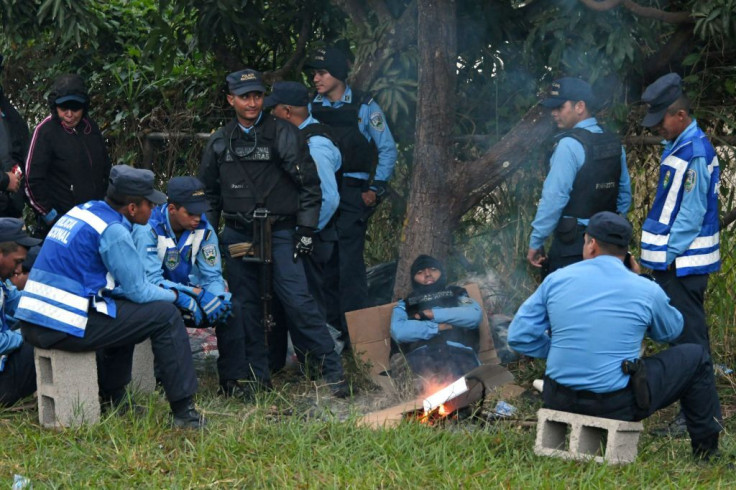
After the elections that took place in Honduras on November 26, the elements of the national police began a strike that they called "brazos caidos” (fallen arms), with the intention of demonstrating the dissatisfaction with the alleged political crisis that the country is going through.
After the elections, the current president, Juan Orlando Hernández, was declared the winner, which provoked a repression, buildings burned down and a wave of violent demonstrations. According to El Pais, the Honduran people are demanding the final and legitimate results of the election of 298 local governments, 128 deputies and the Constitutional President of the Republic for the period 2018-2022, as well as the requirement of transparency and respect for results.
Thousands of citizens took to the streets to support the opposition candidate, television presenter Salvador Nasralla. As reported by the electoral tribunal, with 89.8% of the ballots counted, Hernández, until Monday November 30 had 42.2% of the votes, while Nasralla registered 42.1%, that is, a difference of 3,000 votes.
Suddenly, the electoral court stopped updating the count for 36 hours, since according to them the results were slow to arrive. The following day the count was resumed and gave as winner Hernández. After the final result, Nasralla said his victory had been stolen and called his supporters to take to the streets to protest. "We have already won the election," said the candidate in a television interview. "I will not tolerate this." Hernández has remained mostly silent, calling for “peace” and “national unity” on his Twitter account.
"... I make a call for peace, sanity, brotherhood and national unity. My commitment to work for peace and tranquility in Honduras is more valid than ever." he wrote.
Por último hago un llamado de paz, de cordura, de hermandad y de unidad nacional. Mi compromiso de trabajar por la paz y la tranquilidad en Honduras está más vigente que nunca.
— Juan Orlando H. (@JuanOrlandoH) December 4, 2017
Given the possibility of electoral fraud to allow the re-election of current President Juan Orlando Hernández, people took over the streets, the police began to disobey the government and refuse to apply the curfew, while reporters in the streets are protecting themselves with gas masks, bulletproof vests and helmets, as if they were in a war zone, to be able to inform in real time what is happening and to share their praiseworthy work.
According to Nasralla, 80% of Hondurans do not want Hernandez, candidate of the conservative National Party and president of the country, to remain in power. Due to the great violence that is being lived in Honduras, the president-elect accepted the revision of the electoral process with the intention of clearing his name and denying fraud in the elections. "We are open to check, to review, one, two, three, (times) whatever, we have no problem," said the president.
"I suggest to the electoral tribunal to review the 18,103 acts including collating signatures of booklets and counting votes so that everyone is satisfied, if you don't do it, we are going to a second round," Nasralla wrote on Twitter.
Sugiero al tribunal electoral revisar las 18.103 actas incluyendo cotejar firmas de cuadernillos y recuento de votos para que todo el mundo quede conforme ;si no les parece esto vamos a una segunda vuelta entre JOH y Salvador Nasralla que según el pueblo ganó
— Salvador Nasralla (@SalvaPresidente) December 5, 2017
For the rebellion, Honduras was declared in a state of emergency, and several deaths have been confirmed, including a teenager who lost his life in one of the clashes. Due to the tense climate that the Central American nation is experiencing, the Organization of American States (OAS)- the premier regional forum for political discussion, policy analysis and decision-making in Western Hemisphere affairs - urged Hernández and Nasralla to reach an agreement to review the minutes and verify alleged irregularities in the elections. "The only possible way for the Honduran people to accept and recognize the winner in this electoral process is to reach an agreement between the main candidates," said the head of the OAS observer mission, former Bolivian President Jorge Quiroga.
The OAS also called on political leaders to avoid speeches leading to violent demonstrations, but police keep their indifference. As presented by Bloomberg Politics, Ricard Barreno, political coordinator at the Guatemala City-based Central American Institute of Political Studies said that "day by day there is less confidence in the institutions and the process in Honduras,” also adding that “the electoral council will have to put out an official pronouncement this week or they risk the demonstrations getting worse.”
© 2025 Latin Times. All rights reserved. Do not reproduce without permission.






